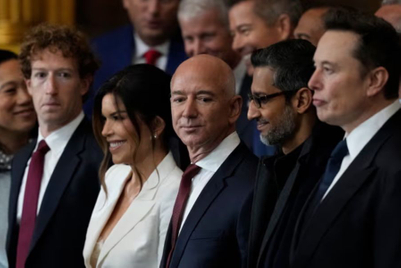.jpg&h=570&w=855&q=100&v=20250320&c=1)
This year has already got off to a dramatic start when it comes to fake news and facts. Or a lack of them.
In week one alone, Apple’s AI news alerts showcased to the world how its tech is helping to create and spread fake news, in its wake damaging the journalistic reputation of the BBC.
Only days later, this story was overshadowed by Meta’s announcement that it was doing away with its third-party fact checkers in the US, while making worrying changes to its DEI policies.
As Joe Biden warned in his farewell address before handing over the US Presidency to Donald Trump, there is a “dangerous concentration of technology power and wealth” and with it, a threat to democracy, distrust and division, as we are “buried under an avalanche of misinformation and disinformation… the truth is smothered by lies told for power and for profit… we must hold the social platforms accountable."
It has to be said, some of the Trumpian language from Mark Zuckerberg of Meta about “masculine energy” and the need “to celebrate aggression a bit more”—coupled with the departure of Meta’s global policy chief Nick Clegg—is a clear nod to the company’s new direction of travel.
We all know what happened at another social media platform when the moderators were dropped: More falsehoods. More harmful content. And more and more marketers walked away.
If this new “masculine” approach results in a rise in nefarious and misleading content with no moderation, will advertisers respond?
There certainly seems to be a nervousness about what is going on. According to the Financial Times, multiple advertising bosses have already raised their concerns about the removal of fact checkers and the possibility of their brands appearing next to toxic content.
The pursuit of facts and the truth should weigh most heavily in our minds because unchecked, fake news spreads far too quickly across the internet. And often with the most serious of consequences, and none of them good.
Could this then be a tipping point? Over the past six months, there has been much more talk across the industry about the importance and benefits of trusted environments that are professionally curated, crafted and regulated—whether that’s TV, radio or news brands.
Encouragingly, since the start of the year at Newsworks we have seen a noticeable increase in people from agencies downloading and reading our Fact not Fake and Trust studies.
In the first of these reports, 74% of people said they turned to newspaper websites or apps to verify stories they read on social media. Among 16- to 34-year olds, this was even higher with 78% regularly turning to established news brands to verify the truth of the content they saw elsewhere.
While in the trust study, Peter Field, a marketing guru and co-author of The Long and The Short of It, found that the link between trust in news brands and advertiser profit growth has risen sharply over the past decade.
Interestingly, that growth has been stronger since 2016, around the time that trust issues began to explode—think Trump, Brexit and Cambridge Analytica, and the emergence of the fake news era.
However, the irony is that—in the name of brand safety—too many advertisers continue to unwittingly block trusted news brands from their plans at a time when investment in the truth is needed most.
The ad industry needs to face the facts.
All the evidence shows trusted journalism benefits advertisers.
Because truth matters. To people. To society. To advertisers.
Rupert Smith is director of communications of Newsworks.





.jpg&h=334&w=500&q=100&v=20250320&c=1)
.jpg&h=334&w=500&q=100&v=20250320&c=1)
.jpg&h=334&w=500&q=100&v=20250320&c=1)
.jpg&h=334&w=500&q=100&v=20250320&c=1)
.jpg&h=334&w=500&q=100&v=20250320&c=1)




.jpg&h=268&w=401&q=100&v=20250320&c=1)
.jpg&h=268&w=401&q=100&v=20250320&c=1)
.jpg&h=268&w=401&q=100&v=20250320&c=1)
.jpg&h=268&w=401&q=100&v=20250320&c=1)
.png&h=268&w=401&q=100&v=20250320&c=1)
.jpg&h=268&w=401&q=100&v=20250320&c=1)
